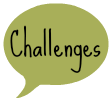Why did he (or whoever he learned the word from) use wung over the standard English winged? If you think about it a second, you might be able to guess why. Historical linguists (people who study how language changes) call this kind of development analogy, just like those annoying SAT problems I had to do a million of: A is to B as X is to __ . Analogy is a way of making one part of your language more similar to another part.
What might be the basis of the analogy this speaker used to create wung? I think there are a few possibilities:
- fling - flung, sting - stung, and also similarly hang - hung. So the analogy might be "fling is to flung as wing is to wung".
- Verbs with three different forms, like sing - sang - sung, ring - rang - rung, also drink - drank - drunk, stink - stank - stunk.
I've noticed other people (and myself too) using the u-forms (the past participles) of words like sing in the past tense instead of the a-forms. How do these sentences sound to you?
- We all stood up and sung the national anthem.
- That stupid dog rolled in poo and stunk up my whole house!
Another possible example: you're probably familiar with thunk, as in "Who'd a' thunk it?" This verb seems to have been formed by analogy to drink - drank - drunk. But again, by this analogy the past tense of think should be *thank. Have you ever heard someone say:
- I thank about him all day long.
Oh, one more reason why wung is interesting: in general, historical linguists have noticed that a given irregular pattern in a language will tend to fade away over time. Based on this principle, we would expect to hear people saying things like *singed, *drinked and so forth. But in this case, we can see that if an irregular form is used frequently enough, it can actually overpower regular forms (like winged) and also different irregular forms (like thought > thunk). And it doesn't just happen in non-standard dialects--did you know the past tense of wear used to be weared?







Here's another one: "sneaked" being replaced by "snuck."
ReplyDelete